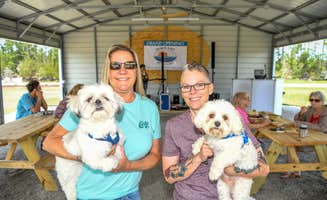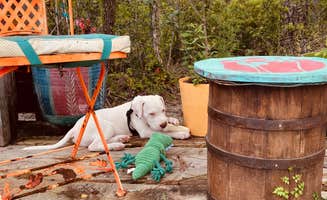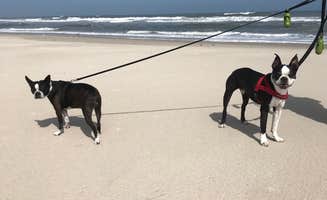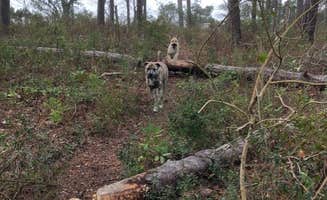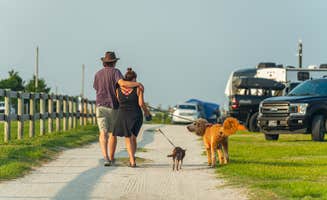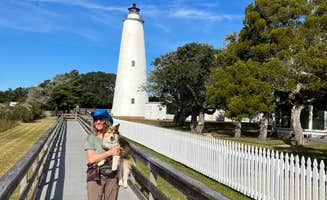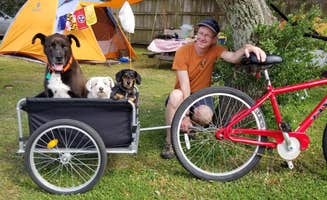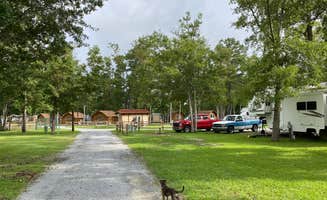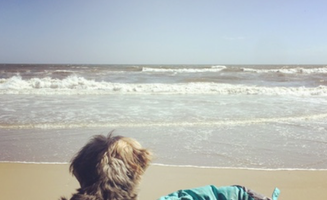Marshallberg sits at the eastern edge of Carteret County with an elevation just a few feet above sea level. The area experiences humid subtropical climate conditions with mild winters and hot, humid summers. During peak summer months, temperatures often reach the mid-90s with high humidity, making overnight camping temperatures remain in the 70s even after sunset.
What to do
Explore coastal waters by boat: Cedar Creek Campground & Marina offers direct water access and gas at their on-site marina. "There is a marina with gas on site. The ramp is small but there is plenty of trailer parking. The small pier would be great to keep the kids entertained with pinfish," notes Turner P.
Hike the Mountains-to-Sea Trail: Parts of this trail system run near several campgrounds in the Croatan National Forest. "We found a Mountain-to-Sea path nearby as well," confirms Tiffany L. when describing the trails accessible from campsites.
Visit historic sites: Take a day trip to nearby maritime landmarks and villages. At Great Island Cabin Camp, "Be sure to bleed your tire PSI all the way down to 18 and drive 10 miles down the dune road to the lighthouse. Totally dreamy and not to be missed!" recommends Sarah G.
Kayak through marshlands: Launch directly from some waterfront campsites. "We were able to launch kayaks almost directly from campsite #11," shares Laura F. about her experience at Oyster Point.
What campers like
Isolation and privacy: Many campgrounds offer spacious sites separated by natural vegetation. At Oyster Point Campground, "Nice quiet rustic with lots of privacy if you choose. Very friendly onsite host," notes Angela.
Clean facilities: Most campgrounds maintain their bathrooms and common areas well. At Cedar Point Campground, "The bath facility is in a very nice building, is heated and has individual locking shower rooms so you have total privacy and security," writes Martha S.
Waterfront access: Many sites back directly onto water features. "It's a nice little campsite by the river, the campsite was very clean, and there are a few trees providing cover, but still enough sun to get some solar, if you need that. There's like a 20 ft path directly from my campsite to the river, which is nice," describes Jenna L.
Budget-friendly options: Several campgrounds offer affordable stays, especially with passes. "Thanks to my Access pass camping here is just $5/night. Gorgeous wooded sites, well-maintained. Waterside! Literally a 60-second walk to water from campsite," explains Mambo M.
What you should know
Weather considerations: Coastal weather can change rapidly and affect your camping experience. "As nice as it was the first day, I had to take down my tent the next day due to the harsh winds and rainstorm. Once that cleared up, though, the weather was back to being as beautiful as before," recounts Zach W. at Long Point Cabin Camp.
Insect preparation: Bugs can be intense, particularly during warmer months. "We loved this campground! It was so easy to access, the roads were well maintained and it was right on the coast. Only complaint is nature related and that's the bugs! The flys are insane but you'll quickly learn to ignore them," shares Hannah F.
Limited services: Many campgrounds have minimal amenities and require bringing supplies. "The only on-island supplies are ice and gasoline, so you must pack in everything. Tap water is potable but tastes very desalinated, so bottled water is recommended," advises Sarah G.
Campsite variations: Sites can differ significantly in size, shade, and terrain. "The sites on the water side are best. Sites with water view are best. Most sites had shade for either the early or late part of the day," notes Jody B.
Tips for camping with families
Consider accessibility needs: Some campgrounds offer special accommodations for families with mobility concerns. "The sites are level and have a paved parking pad that they are pretty strict on you keeping all wheels on and a gravel area with a picnic table, fire pit, and two lantern poles (that also work good for putting up a clothes line or dog zipline)," details Steve V.
Find entertainment options: Look for campgrounds with multiple recreation possibilities. "The pool was closed when we stayed," notes Turner P. about Cedar Creek Campground, but many campsites have alternative activities like "fishing at Ophelia Inlet" as Justin G. mentions.
Pack for varying temperatures: Coastal areas can experience significant temperature fluctuations. "Bathrooms are separate from the showers. The bathrooms were slightly heated. The showers, on the other hand, were not heated," warns Robert D., suggesting families should "be prepared to take a warm shower in freezing weather."
Plan for wildlife encounters: Animal sightings are common and can be educational for children. "There is a large raccoon population on the island so store your food and water accordingly. We did experience a raccoon running off with a dry bag full go food that wasn't secured to a permanent structure," cautions Sarah C.
Tips from RVers
Site selection for solar power: If using solar, choose sites strategically. "We had site 11 which was on the water side with a path to the water. It was shady for the later part of the day (which wasn't great for our solar panels)," notes Jody B.
Road conditions awareness: Access roads to some campgrounds may present challenges. "The roads on the property are a little rough and could use some grading, but they have obviously had some bad weather recently that hasn't helped," observes Turner P.
Utilities reliability: Some campgrounds have inconsistent power. "The sites do not have water hook ups so make sure your RV fresh water tanks are topped off, or there are plenty of potable water points throughout the campground to fill up you jugs," advises Steve V. about Cedar Point Campground.
Cell service considerations: Coverage varies widely between campgrounds. "Verizon service was good," confirms Jody B., which is important information for RVers who need to stay connected.


